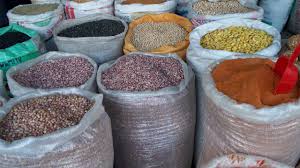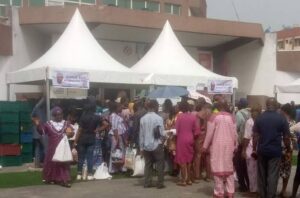


Stakeholders are advocating for immediate action to address food security issues in Ondo, Ekiti, and Osun
In a bid to address the growing concerns over food security, stakeholders in Ondo, Ekiti and Osun States have urged both citizens and government at all levels to prioritize mechanised and technology based farming as against subsistence farming.
They called for increased government support and community involvement in agricultural activities to mitigate food scarcity and stabilize prices in the region.
The Chairman, Ondo State Agricultural Commodities Association (OSACA), Chief Abiodun Adejo emphasized the critical need for concerted efforts in agriculture.
Chief Adejo highlighted the importance of government support, particularly in subsidizing land clearing and preparation costs which he described as prohibitive in the region.
“The way out is for all of us to go back to farming,” Chief Adejo urged, stressing that every individual could contribute to food production, even with small-scale efforts like home gardens.
Also, the Acting Rector of the Rufus Giwa Polytechnic, Owo, Mr Olorunwa Adegun, disclosed plans by the institution to utilise its vast land resources for agricultural purposes.
Adegun said that with approximately 1,500 hectares of land, the polytechnic aims to achieve food surplus by involving its faculties in arable farming.
“We are providing conducive environments and logistics,” Adegun assured, stressing that the institution is in collaborations with the state government to procure necessary farming equipment and seeds.
Echoing the same sentiments, Mr Adeola Akinyugba of the Ondo State Agric Inputs Supply Agency highlighted ongoing efforts to support farmers through the distribution of agricultural inputs across the state’s 18 local government areas.
He assured of the state government’s commitment to reducing food prices through continuous investment in agriculture.
“Furthermore, the state government has embarked on initiatives like cluster farming to enhance security for farmers and boost agricultural productivity.
“Gov. Lucky Aiyedatiwa’s administration has prioritised providing support to farmers, including the distribution of palliative commodities and farm machinery, as well as promoting cluster farming for efficient land use,” Akinyugba said.
In Ekiti, the State Government has reaffirmed ý commitment to enhancing agriculture and ensuring food security
This was disclosed by the Commissioner for Agriculture and Food Security, Mr Ebenezer Boluwade, and the Director-General of Community Communications, Mrs. Mary Osho-Omotosho.
Gov. Biodun Oyebanji’s administration has embarked on several initiatives aimed at achieving food surplus and modernisng agricultural practices across the state.
Key among these initiatives is the Rural Agricultural Access and Market Project (RAAMP), which focuses on improving road networks crucial for agricultural development.
“The administration conducted a thorough diagnostic assessment involving youths and farmers to identify challenges hindering food production.
“This assessment informed strategic interventions such as the establishment of farm clusters in all local government areas.
“Over 30 such clusters have been created, providing subsidized opportunities for farmers and facilitating easier engagement in agriculture.
“Additionally, the state government has distributed over 10,000 bags of rice and maize at subsidized rates to support local farmers,” stated Mrs. Osho-Omotosho.
Also, Boluwade highlighted efforts to address market challenges, noting, ” some traders buy bulk purchases of agricultural produce from the North, and who then resell at higher prices. This remains a concern to government.”
He said that the Ekiti government plans to establish storage facilities to preserve produce for local consumption and foster linkages across the agricultural value chain.
“In response to security concerns, the governor recently authorised the recruitment of personnel as Agro Rangers and Agro Marshals to safeguard farmlands from threats.
“Special committees have also been set up to manage farmer-herder conflicts effectively,” the commissioner said.
He said that the ‘Bring Back the Youth in Agriculture Planting Season’ initiative has attracted over 400 young farmers, with ongoing efforts to engage more youths and empower them through comprehensive training and support.
Speaking in the same vein, Mr Olatunji Ayegbusi of the Farmers Community Association in Ikole-Ekiti said that there was need for more support, urging the government to provide tractors and seedlings to enhance productivity.
Also, Dr Busuyi Adesina, an economy expert, urged governors in South-West to prioritize agricultural investment to boost revenue and ensure food security.
He emphasized the need for infrastructure improvements and market regulations to support farmers effectively.
Addressing underlying challenges, an agriculturist, Mr John Oni, said that the impact of insecurity and market irregularities on agricultural productivity, called for direct government intervention in the distribution of farm inputs.
In Osun, Alhaji Sulaimon Araokanmi, Chairman of AFAN in the state, stressed the need for government support in funding, providing farming inputs, and allocating land to attract more youth to farming.
Also, Dr Abosede Ige, a lecturer at Obafemi Awolowo University, highlighted the adverse impact of insecurity on food production nationwide.
She urged the government to prioritize farmers’ security to restore confidence and boost agricultural productivity.
Similarly, Mr Wole Oladapo, CEO of Agro-aid Services Consult, called for robust agricultural policies and investment to harness the state’s agricultural potential effectively.
He advocated for a price control unit to manage food prices amidst inflationary pressures.



